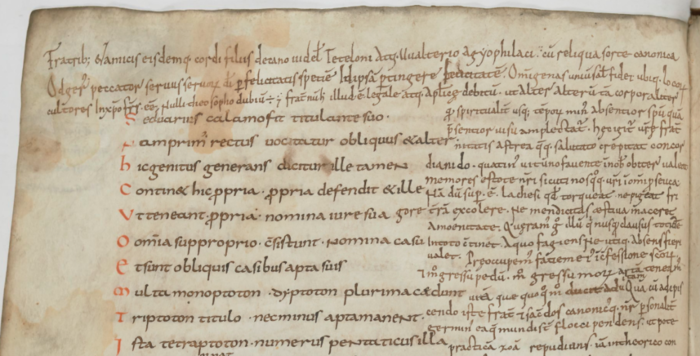Previous events - Page 22
Professor of Systematic Musicology, Clemens W?llner, from the University of Music Freiburg, will speak at RITMO's Seminar Series
Department seminar. Gaétan de Rassenfosse is an Associate Professor in Science & Technology Policy at EPFL (Lausanne, Switzerland). He will present the paper: "An Empirical Analysis of Patent Office Delays and Market Entry Timing."
Department seminar. Adam Altmejd is a Post-doc at the Department of Finance, Stockholm School of Economics and a researcher at the Institute for Social Research (SOFI), Stockholm University. He will present the paper: "Inheritance of fields of study."
Nikoleta Yordanova presents the paper Negotiating European Integration: Council Responsiveness to Public Opinion at the Tuesday Seminar on 17 October 2023.
How can we use drawings and graphic narratives to develop and communicate our research? The Border Readings group at ILOS has invited researchers and artists, guest researcher Kari Korolainen and ILOS researcher Fabian Heffermehl, to share with us their thoughts and experiences of using drawing and graphic storytelling to think about their research problems – and thinking with their research materials – in visual and bodily ways. Welcome to this open discussion, if you are interested in exploring these possibilities or already have experiences which you might share.
Department seminar. Samuel Dodini is a Postdoctoral Fellow at the Department of Economics, Norwegian School of Economics (NHH). He will present the paper: "How Do Firms Respond to Unions?" (written with Anna Stansbury and Alexander Willen).
Department seminar. Giulia Giupponi is an Assistant Professor of Public Economics at Bocconi University. She will present the paper: "Forward-Looking Labor Supply Responses to Changes in Pension Wealth: Evidence from Germany" (written with Elisabeth Artmann and Nicola Fuchs-Schuendeln).
Department seminar. Roweno J.R.K. Heijmans is an Assistant Professor at NHH Norwegian School of Economics. He will present the paper: "Unraveling Coordination Problems."
Jamie Y. Findlay explores the idea that the distinction between fast/automatic and slow/deliberate thought processes can be drawn inside the domain of language processing.
Department seminar. Sandeep Baliga is the John L. and Helen Kellogg Professor of Managerial Economics and Decision Sciences in the MEDS Department at the Kellogg School of Management, Northwestern University. He will present the paper: "Long Wars" (written with Tomas Sj?str?m).
Department seminar. Karine Nyborg is a Professor at the Department of Economics, University of Oslo. She will present the paper: "Moral responsibility as a driver of polarization" (written with Kjell Arne Brekke).
Department seminar. Marta Prato is an Assistant Professor of Economics, Bocconi University. She will present the paper: "Career Choice of Entrepreneurs and the Rise of "Smart" Firms" (written with Ufuk Akcigit, Harun Alp, and Jeremy Pearce).
Department seminar. Pamela Giustinelli is an Assistant Professor at the Department of Economics, Bocconi University. She will present the paper: "The Coherence Side of Rationality: Rules of thumb, narrow bracketing, and managerial incoherence in corporate forecasts" (written with Stefano Rossi).
Bernhard Hollick (IAKH, UiO)
Assistant Professor of Musicology, Michiel Kamp, from Utrecht University, will speak at RITMO's Seminar Series
Once a month, NCMM invites international guest speakers to present on topics within molecular life science and medicine.
Seminar with Marta Hanson.
Nicolai Tangen will give you a unique insight in the world of financial investments. Open for all students and staff.
Department seminar. Kathrin Schlafmann is an Assistant Professor at the Copenhagen Business School. She will present the paper: "Expectations and Wealth Heterogeneity in the Macroeconomy" (written with Tobias Broer, Alexandre Kohlhas, and Kurt Mitman).
Geir Flikke presents the paper “Speaking to Europe” – Euro-Atlantic Integration as a Strategic Narrative under Zelensky at the Tuesday Seminar on 19 September 2023.
Department seminar. Sebastian Siegloch is a Professor of Economics at the University of Cologne.
On the 12th and 13th of September 2023 Ariane Dupont-Kieffer will give four lectures about the history of econometrics and the specific contributions of Frisch and Haavelmo in the formative period of econometrics as discipline specific methodology. The lectures are open to all interested.
Theresa Kuhn presents the co-authored paper When a line becomes a wall. The effect of intra-EU border closures on European identity during the COVID-19 pandemic at the Tuesday Seminar on 12 September 2023.
On the 12th and 13th of September 2023 Ariane Dupont-Kieffer will give four lectures about the history of econometrics and the specific contributions of Frisch and Haavelmo in the formative period of econometrics as discipline specific methodology. The lectures are open to all interested.














.jpg?alt=listing)






